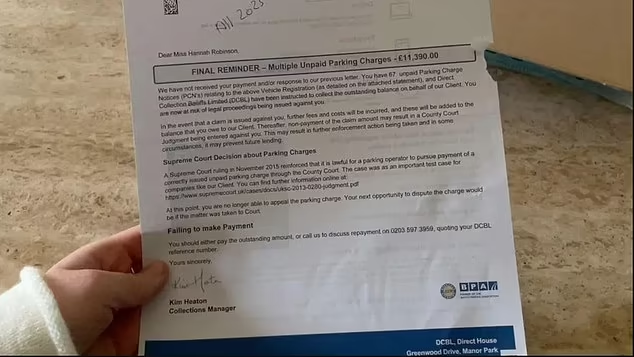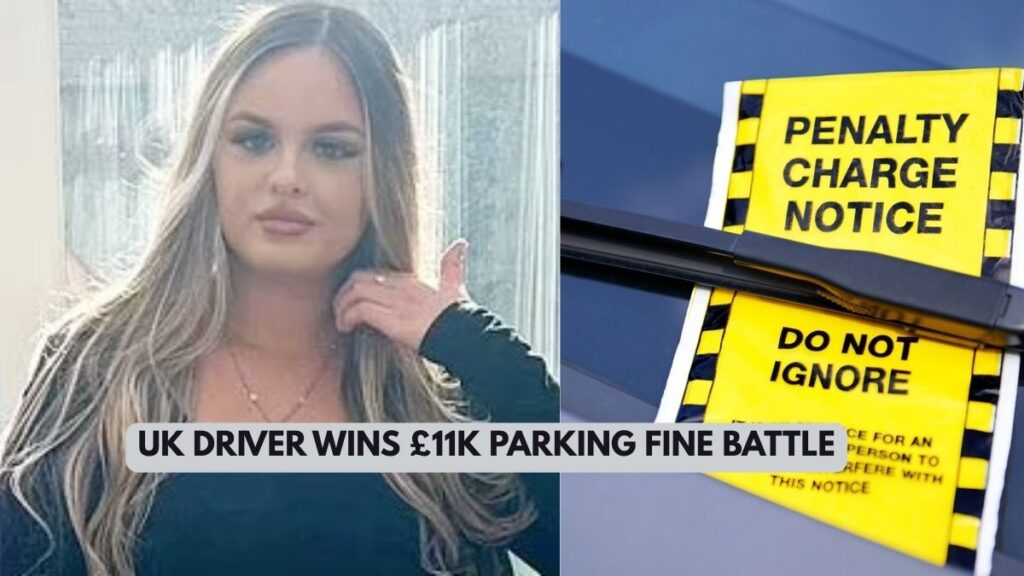A young driver in the UK was slapped with parking fines amounting to more than £11,000 after being accused of breaching a rigid five-minute payment rule at a private car park. But in a rare win for motorists, a judge ruled the charges “unreasonable,” prompting renewed scrutiny over private parking enforcement.
67 Fines for Delayed Payments—Despite Paying
Hannah Robinson, 21, from Eaglescliffe, County Durham, received a staggering 67 penalty charge notices from Excel Parking Services. The notices were tied to parking at the Feethams Leisure car park in Darlington, where the parking firm enforces a little-known rule requiring drivers to pay within five minutes of arrival.

Even though Robinson paid for her parking sessions, the firm claimed her payment delays—often caused by poor phone signal or technical issues with the payment app—violated their terms.
Over several years, the individual charges ballooned into a total demand of £11,390.
Judge Slams ‘Unreasonable’ Demands
In February 2024, Excel Parking took legal action to recover the full amount. But District Judge Janine Richards, presiding over the case, sided with Robinson.
Calling Excel’s behavior “unreasonable,” the judge dismissed their claims and ordered the firm to pay £10,240.10 in costs to the Access to Justice Foundation, a legal charity that supports access to justice for disadvantaged individuals.
“It is not reasonable to penalise drivers who have paid but were delayed by technical issues,” the judge noted in court, as reported by The Telegraph.
Public Outcry and Calls for Reform
This case has ignited widespread backlash and prompted a broader conversation about private parking regulation in the UK. Critics argue that overly strict and poorly advertised rules—like Excel’s five-minute payment policy—are being used to trap unsuspecting drivers.
According to the British Parking Association (BPA), private parking companies issue millions of fines annually, with many relying on automatic number plate recognition (ANPR) systems to track vehicle movements.
In light of Robinson’s case, both the BPA and the International Parking Community (IPC) have announced a review of the five-minute payment rule. They’re considering extending grace periods to reduce unfair penalties caused by app failures, payment confusion, or poor signal.
Government Action on Private Parking Practices
This isn’t the first time the UK government has had to step in. In 2022, ministers introduced the Parking (Code of Practice) Act 2019, aimed at cleaning up the private parking industry by:
- Setting standardised rules across firms
- Capping penalty charges
- Banning aggressive tactics
However, enforcement was paused in 2022 after legal challenges by major parking firms. According to a 2023 statement by the Department for Levelling Up, Housing and Communities (DLUHC), the Code is under review but is expected to return in a strengthened form.
Campaigners like Which? and MoneySavingExpert are urging stricter controls and faster implementation of reforms.

What to Do If You Receive a Private Parking Fine
If you believe a parking fine is unfair:
- Gather evidence (photos, receipts, timestamps)
- Appeal to the parking company
- If rejected, escalate to an independent appeals service like POPLA or IAS
- If taken to court, seek free legal advice via Citizens Advice
A Victory for Common Sense?
Robinson’s case highlights a systemic issue that affects thousands of UK drivers. While her victory in court won’t undo the stress of years-long legal threats, it could push authorities to finally implement more driver-friendly parking rules.
This article has been carefully fact-checked by our editorial team to ensure accuracy and eliminate any misleading information. We are committed to maintaining the highest standards of integrity in our content.

Himanshu Sharma writes for Weekend Spy, focusing on recruitment, government schemes, and current affairs. He is dedicated to making complex information accessible to readers.
Himanshu enjoys playing chess, hiking, and trying new recipes, always seeking ways to combine his love for writing with his passion for exploration. Connect with Drop him an email at [email protected].







